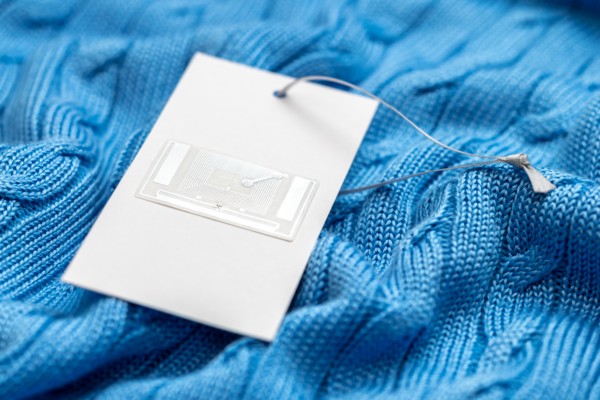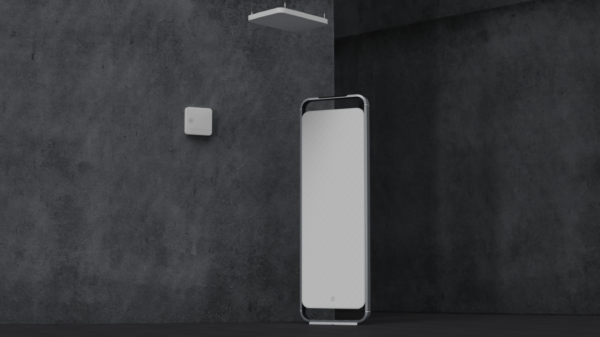Checkpoint Systems, a global leader in radio frequency identification (RFID and RF) technology and inventory control solutions, will showcase its RFID product range at the Retail Technology Show from 26-27 April at Olympia London.
Kelly Duffy, Director, Checkpoint ALS UK, explains more about Checkpoint’s RFID offer and why it’s unique in the market.

Which products will you be exhibiting at the Retail Technology Show?
RFID is a solution to create value for retailers, so this year we are focusing on RFID and what it can deliver for retailers.
We’ll be exhibiting an extensive range of inlay and label designs, including our DUÉ Mini label and UNO dual technology inlays, which were two of the most popular products at the recent EuroShop exhibition in Germany this year.
For us, this show isn’t about simply selling more of what everybody's already doing. It's about how do we help them to take their businesses forward and RFID is one of the most important technologies that can bring that value to retailers.
For any retailer to implement an RFID program, they need three things – hardware, software and tags/labels. Checkpoint manufacturers its own products and in all three areas, that is one of our USPs.
At the Retail Technology Show we will have a full set up to demonstrate product capabilities for all retailers – whether they are new to RFID and want to understand how it can add value to their business or have used it for a long time and now looking to add additional benefits to their program. For these retailers we’ve got more innovative RFID tagging products with additional functionalities compatible with software such as ItemOptix™ - our next-generation inventory management system.
Everything that we're showing will demonstrate the Return on Investment (ROI) of installing RFID. We’ll even be able to give retailers a rough calculation of what that might be, based on some key business information, such as how many stores they have, whether they operate online and the volume of products they turnover each year.
Independent research by ECR has demonstrated that on average, retailers deploying RFID saw a sales improvement in the range of 1.5% - 5.5%, and all companies taking part stated unequivocally that the ROI had been achieved. (1)
A key focus at the Retail Technology Show will be Checkpoint’s DUÉ Mini label and the UNO dual technology inlays. These proved very popular at this year’s EuroShop 2023…why?
Our DUÉ Mini and UNO labels were popular because they offer retailers the ability to do more than one thing with their investment.
UNO is one of Checkpoint’s leading RFID inlays, used by some of Europe’s largest retailers. It can be used to control stock inventory, product returns and data privacy, as well as enhanced performance with RF EAS detection, meaning it can be deployed in a range of different ways.
The benefit of UNO for a retailer is that it has all of the functionality of RFID, alongside the functionality of RF, which is about loss prevention. This is particularly pertinent for retailers with extensive store portfolios that have already invested in loss-prevention, RF hardware, and don’t want to replace it. The Uno allows them to combine their existing loss prevention functionality and inventory management in one label application at the point of manufacture, so there’s no extra cost. In fact, there can be cost-savings because it allows retailers to remove hard-tagging – and the need for those tags to be applied and removed by store staff.
The DUÉ Mini label combines two technologies in one, offering brands the chance to engage with their customers through near field communication (NFC) technology whilst realising the benefits of RFID-controlled inventory management.
A key benefit of NFC-embedded labels is that they also allow direct consumer communication simply by holding a smartphone close to the label. This means retailers or brands are able to take the consumer directly to a website, product information or marketing messages. It could also hold information that verifies the authenticity of a product, increasingly important for premium brands in the resale market, or act as a digital passport for products in the circular economy in the future. And if you’re using RFID for stock control, why not implement NFC for customer engagement? This could even include styling advice or upselling and cross-selling.
Of course, with RFID, there’s also the ability to protect inventory too. Checkpoint’s latest loss prevention, RFID solution SFERO™, will also be on display at the Retail Technology Show. It’s a modular RFID as EAS solution specifically for apparel. It has high detection performance to minimise losses with a unique design that retailers can tailor to the requirements of individual outlets without compromising store design.

How important is Checkpoint's ability to manufacture labels in-house? Does that improve efficiency and revenue? How efficient is this in-house capability for Checkpoint customers?
Checkpoint has complete quality control across our entire RFID offer because we manufacture all our hardware and tag/labels in-house, meaning we are completely invested in making sure everything is top quality. This is significant not only from a compliance perspective, but also from a traceability and ethical point of view; an ethical supply chain is something particularly significant for the fashion industry.
This also enables us to focus on our R&D and design, because we're always talking to all of our customers and hearing what direction they are going in. This means we can align our R&D with their development. This might be frictionless shopping, loss prevention, or digital passports. We ask them how we can help and what products they need us to develop.
Our total control of our products and supply chain means it’s also more efficient for the retailer because we consider how labels can be converted, printed and encoded for them, and also about the logistics of where those things are done to create the most efficient process from a manufacturing perspective.
What are the biggest challenges facing retailers today and how do Checkpoint’s RFID solutions, particularly from a labelling perspective, help address those?
Different retailers have different challenges; there is no one size fits all and they don’t all come with the same problems. RFID can be adapted to fit any business model and help improve its financial performance.
For omnichannel retailers RFID helps them to be more profitable because it can speed up returns and turn all their stores into distribution centres, which can reduce transportation costs across the business. For large scale retailers it's all about stock availability and cost efficiencies, which might be via frictionless shopping.
What feedback have you had from retailers who have invested in Checkpoint’s RFID solutions?
We have had tremendous, positive feedback from retailers. One leading, international sports brand, for example, advised that having implemented Checkpoint’s RFID solutions, it has helped them to accelerate its online to offline capabilities by providing a clear line of sight to the inventory levels.
In recognising the benefits of RFID, another international retailer reported that the goal of RFID is to reduce the number of hours they spend in the backroom, so they can invest those hours in the front of house, allowing them to focus more on connecting with their customers.
How do you see the RFID market evolving in the next few years?
When most retailers first integrate RFID, they do it via the simple solution of a sticker or a ticket attached to products. However, we’re now seeing much more interest in sewn-in or embedded solutions. This includes sewing RFID into the garments themselves or embedding them – such as in shoes or trainers, which can be done during the manufacturing process.
Retailers are considering these solutions because one of the key challenges they face is the cost of returns. If an item still has an RFID tag on it, inside the care label or in a pocket tag, it makes returns so much easier because it speeds up the time and cost efficiencies. And thinking ahead for the longer term, we’re also considering how RFID might survive washing for that second or third-hand market.
We also expect more retailers to embrace frictionless shopping; if the RFID label is attached in the traditional way, it can be pulled off, so even an honest customer can pick up a garment where a tag's fallen off. They drop it into the basket but are not going to pay for it because it's not there. Embedded or sewn-in tags negate this issue. RFID also offers the opportunity for retailers to understand when and where an item was sold, meaning if someone tries to return a stolen product, it could be immediately identified as not previously paid for.
We also see NFC in tags offering much wider customer engagement. It might be the product information mentioned earlier or even a promotion, such as a discount on the next purchase: RFID enables the tag to be a conduit to whatever solutions the retailer chooses.

With the growth and proliferation of online retail, will physical stores still have a role to play in the future?
Absolutely. Humans are social animals and shopping can be a social event, however much time we may spend online in the digital world.
The future will be omnichannel retailing. For instance, one of the most profitable things for retailers is click and collect because shoppers collecting items have a tendency to buy something else while they’re there.
In fact, one major British brand we’re working with is opening more stores because it says they encourage shoppers to explore the wider range online. It says where it has stores, it can see the online sales clusters associated with those outlets. RFID allows retailers to see exactly what stock they have and where it is, enabling them to divert products to where they are needed.
In conclusion, Kelly Duffy advised, ‘RFID has proven, in most cases, to deliver an ROI in 12 months or less for those retailers who have successfully deployed RFID technology into their retail stores. The good news is that Checkpoint’s RFID is proven technology in helping retailers in their digital transformation journey to omnichannel retailing.’
Checkpoint will be showcasing its innovative RFID solutions on stand 5C35, The Retail Technology Show, 26 – 27 April, Olympia, London.
(1) ECR (Efficient Consumer Response): Measuring the Impact of RFID in Retailing, Study 2018
